Please Note: This post may contain affiliate links. If you click one of them, we may receive a commission at no extra cost to you. As an Amazon Associate, I earn from qualifying purchases.
Dealing with depression is often compared to going through a roller coaster ride, where you find yourself being at the top one moment and at the bottom the next. It is very understandable that lots of people think about a relapse after some period of time. Luckily, there are methods that can help you prevent the occurrence of these unwanted depression periods! Shall we explore some doable and provoking ways that can have a huge impact on your overall mental health?
Top Takeaways and Key Concepts
- Identify your triggers: Track situations, people, or media that worsen your mood.
- Keep a journal: Write or doodle daily to process emotions and track progress.
- Build a support network: Engage friends, family, pets, and support groups regularly.
- Establish healthy routines: Prioritize sleep, balanced meals, and enjoyable physical activity.
- Practice mindfulness: Use meditation, breathing exercises, and yoga to stay present.
Summary:
The text emphasizes practical strategies to prevent depression relapses. It highlights identifying personal triggers, such as music, smells, or stressful situations, and preparing for them in advance. Journaling is recommended to process emotions, recognize progress, and foster creativity. Strong support systems—including friends, family, pets, and professional help—play a crucial role in emotional resilience. Establishing consistent routines for sleep, nutrition, and exercise supports stable mental health, while mindfulness practices like meditation, yoga, and sensory exercises help maintain emotional balance. Creating a personalized action plan with goals and emergency contacts ensures ongoing support, empowering individuals to manage depression and maintain hope.
Understanding Your Triggers

When it comes to triggers for depression, did you know that something as simple as a song can send your mood spiraling? Researchers found that certain tunes can trigger memories linked to past experiences, good or bad. So, if you find yourself suddenly craving ice cream while listening to “Sweet Caroline,” just remember: it might be a nostalgic trip down memory lane—or an emotional rollercoaster!
“Life is like riding a bicycle. To keep your balance, you must keep moving.” – Albert Einstein
First, you need to know what could cause a relapse. Have you ever noticed that some things might make you feel worse? uncovering these triggers is like uncovering the hidden map to your emotional treasure, whether it’s work stress or family strife. I believe we don’t give awareness enough credit for how powerful it can be.
Once you know what sets you off, you can get ready for when it happens. If being around a lot of people makes you anxious, for example, you may plan your outings at times when there aren’t as many people around or bring a buddy you trust along for support. Honestly, knowing what makes you tick (or tock) offers you an edge in dealing with those sentiments before they get worse.
Writing in a diary is like having a therapist on call all the time, but you don’t have to pay them by the hour. Writing down your thoughts and feelings for a few minutes can really work wonders. Writing can help you sort through your feelings when life gets too much and your head seems like a tornado. Have you ever just stared at the paper and not known what to do? That’s just OK! Sometimes, just letting your hand move freely might help you see things in a new way.
Triggers and Tactics: Understanding Your Relapse Signals
– The Smell of Cookies: Studies show that certain smells, like freshly baked cookies, can trigger happy memories. But if you’re trying to avoid a relapse, those cookie-scented candles might just lead you straight to the kitchen for a binge!
– Weather Woes: Did you know that rainy days can affect your mood? Scientists found that gloomy weather can make people feel more down. So next time it rains, grab an umbrella and some sunshine in a bottle (or just your favorite snack) to fight back!
– Music Mood Swings: Listening to sad songs when you’re feeling low can actually make things worse. It’s like inviting your feelings over for a pity party—complete with ice cream and no fun allowed! Try upbeat tunes instead; they might just dance those blues away!
Keeping a journal is also a way to remember how your mental health has changed over time. It catches those brief moments of clarity or even the hard days when you feel like you’re walking through muck. I think a lot of people don’t realize how important it is to look back and recognize how far they’ve come. You might read a blog from months ago and remember that what seemed impossible at the time is now just a memory. This shows that progress is frequently slow but very genuine.
And don’t forget how good it feels to write things down. Think of all those thoughts that are going about in your head like a shaken Coke can. It’s going to burst at some point! Writing in a journal is a safe way to let some of that stress out. Writing down your thoughts can be calming. It’s like you’re letting aspects of yourself that have been trapped inside out.
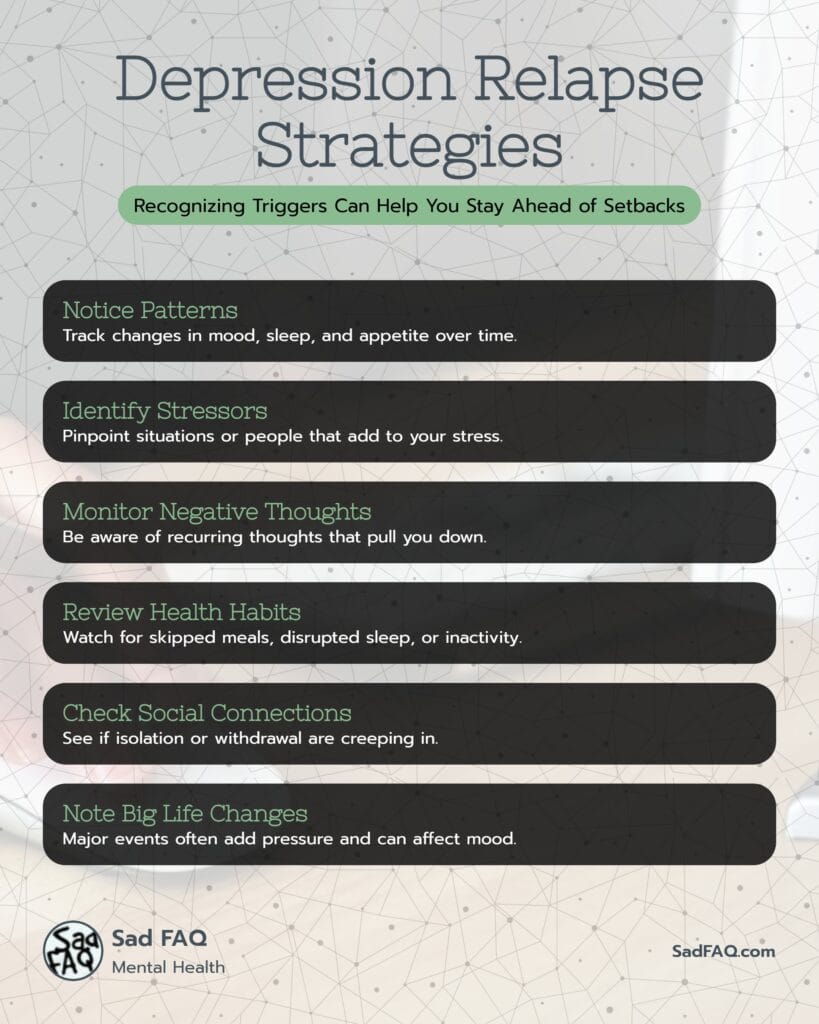
It is possible to be creative with your journal too! It doesn’t have to be all emotional and serious; you may want to doodle or put stickers, quotes, or drawings. Perhaps write letters to your future self or list things you are grateful for each daythese small details make the whole process more fun. Really, any means of self-expression that you select is the right one!
In conclusion, whether you decide to write a journal daily or only when you feel inspired, a journal can be an amazing instrument to keep your mental health under control and successfully go through life’s highs and lows. Moreover, it gives you a chance for looking back at yourself and development. This can be a real opportunity to acknowledge the accomplishments of your journey, whether they are big or small!
Building Your Support Network

Having a support network for managing depression is like having a superhero team—each member has their own special powers! Did you know that people with strong social connections are happier and healthier? In fact, studies show that just having a friend to binge-watch shows with can lower stress levels. So, next time you’re feeling down, remember: your couch potato buddy might just be your emotional sidekick!
“Surround yourself with only people who are going to lift you higher.” – Oprah Winfrey
Let’s talk about friends and family because having a strong support system is really important for staying clean. Who doesn’t want to talk over coffee or tea? Being around individuals who understand what you’re going through might make a big difference in keeping your mental health.
You might want to join support groups where other people have gone through the same things. Speaking of which, meeting others who really get what you’re going through might seem like discovering that missing piece of the puzzle! These meetings give you not only sympathy but also new ideas for how to deal with problems that have worked for other people.
But let’s be honest: we all need a little more help sometimes. Getting help from a professional doesn’t mean you’re weak; it’s rather like having a trusted friend on your mental health journey. Therapists have a lot of tools and methods that might seem almost magical. Think of them as emotional Swiss Army knives that are always ready to handle anything life throws at you. They offer plans for everything, from how to deal with anxiety to how to get through despair.
Support Squad: Building Your Team Against Relapse
– Pet Power: Did you know that having a pet can boost your mood? Studies show that cuddling with a furry friend releases happy hormones. So, if you’re feeling down, grab your dog or cat and let the snuggles begin!
– Friendship Food: Sharing food with friends not only makes meals tastier but also strengthens bonds. Ever notice how pizza tastes better when you’re laughing with pals? Next time you feel blue, gather your crew for a cheesy slice of joy!
– Text Therapy: Texting your friends can actually lift your spirits! Just sending a silly meme or an “I miss you” message can spark laughter and connection. It’s like instant happiness delivered right to your pocket—no delivery fee required!
At first, I believed therapy would be me sitting on a couch while someone wrote down what I said and asked me how I felt. But really, it’s a lot more than that! When you’re really struggling, a therapist might help you see things in a new way. It’s like having a GPS for your feelings. Sometimes you need someone to assist you find your way again when you’ve taken a wrong turn or struck a dead end.
And since we’re on the subject of talking things over, it feels great to be able to share your ideas with someone who understands and doesn’t judge you. You know how sometimes when you’re talking to a friend about your problems, you suddenly realize how foolish they sound? Now picture doing that with someone who knows how to help you get to the bottom of things and find answers! It can show you paths that were concealed by perplexity or self-doubt before.
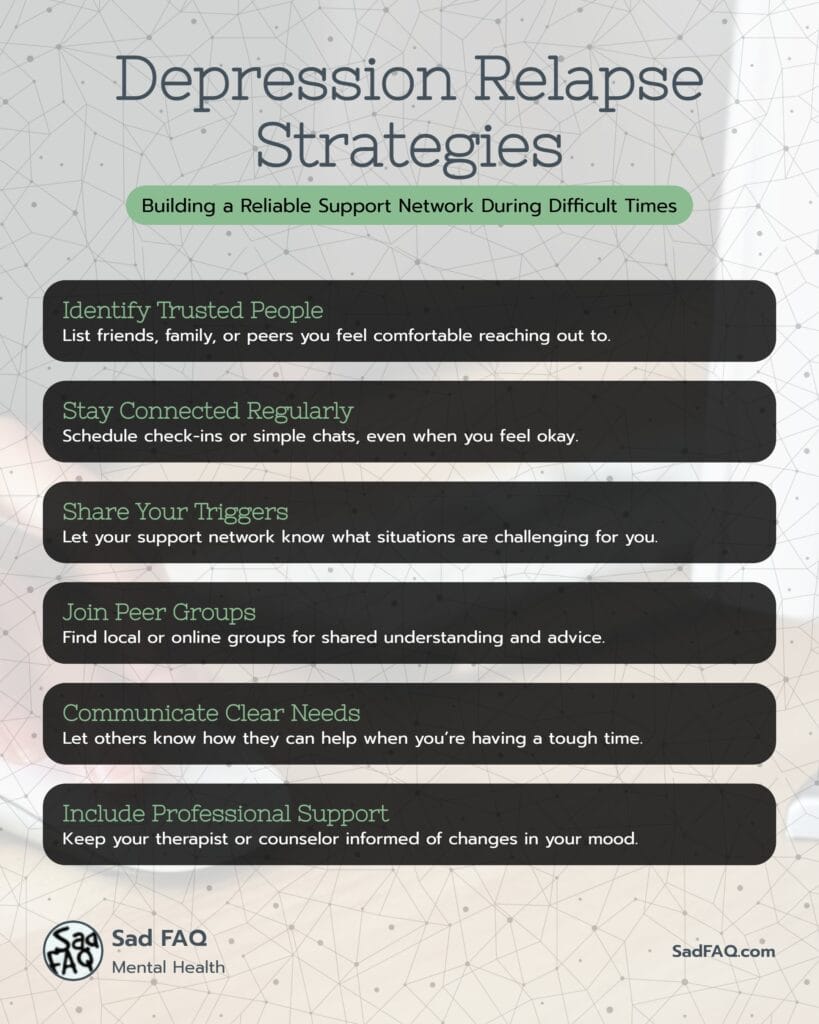
On the one hand, people are really convinced that therapy should be their last resort. However, it is not only the case when the client is at his/her lowest point; if you ask me, therapy is a wonderful tool to help you face life challenges or just become a better self. Mmm! But it’s even better if you think of it as regular car maintenance before its breakdown; routine check-ups will keep everything going smoothly!
So, if you’re feeling stuck or overwhelmed, don’t hesitate to ask for professional help. It is very important that you find the right therapist. They should feel like a good match, someone you can trust and talk to. After all, it is all about finding the right way to live a healthy life! Remember, seeking help is one of the most courageous things you can do; it reveals an immense amount of strength and self-awareness!
Establishing Healthy Routines

Did you know that having a consistent bedtime can help reduce the risk of depression? It’s true! Scientists found that people who stick to regular sleep schedules are less likely to feel down. So, if you want to avoid a relapse, consider this: your bed is not just for sleeping; it’s also where dreams of being a well-rested superhero come true!
“Take care to get what you like or you will be forced to like what you get.” – George Bernard Shaw
I think everyone agrees that routines help us stay organized, but they’re especially important when we’re trying to get over sadness. Setting up daily routines for sleep, food, and exercise can help you stay stable in the middle of all the stress in your life. It’s like building an emotional fortress!
Let’s start with sleep: trying to get a good night’s sleep every night will enhance your mood and energy levels a lot. Try making a bedtime routine that helps you relax. For example, you may dim the lights and drink chamomile tea or read until you feel sleepy (extra points if it’s not too exciting!). Believe me, getting enough sleep is very important!
Next is food! Eating meals that are balanced and full of fruits and vegetables is excellent for your body and mind. Think of food as fuel: making healthy choices will make your days brighter (and cut down on hangry moments).
Routine Rescue: Finding Stability in the Everyday
– Morning Dance Party: Starting your day with a little dance can boost your mood! Just 10 minutes of grooving to your favorite tunes can make you feel like a superstar and set a positive tone for the day. So, channel your inner pop star and shake it out!
– Color Your World: Did you know that coloring isn’t just for kids? Adult coloring books have become a thing because they help reduce stress and improve focus. Grab some crayons or markers, unleash your creativity, and watch those worries fade away—one doodle at a time!
– Snack Attack Strategy: Eating healthy snacks can actually help keep your mood stable. Foods like nuts and berries are not only delicious but also packed with brain-boosting nutrients. So next time you’re feeling down, skip the chips and reach for some trail mix instead—it’s like giving your brain a hug!
And then there’s exercise, which is like magic for your mood. If there were a superhero for happiness, it would definitely be endorphins. These little men are like your body’s natural cheerleaders, coming in to get rid of sadness. When you have a lot of endorphins in your blood, who needs capes and spandex? Moving your body can make you feel better faster than a double shot of espresso.
Now, let’s talk about what exercise is. Spoiler alert: you don’t have to lift heavy weights or work out hard in the gym! Anything that gets you moving and grooving is a form of regular physical activity. For me, that sometimes means dancing around my living room like no one is watching. Who wouldn’t want to do some dubious dance moves to their favorite songs? The best part is that it’s not only enjoyable, but it’s also a great way to get some cardio in without feeling like you’re working out.
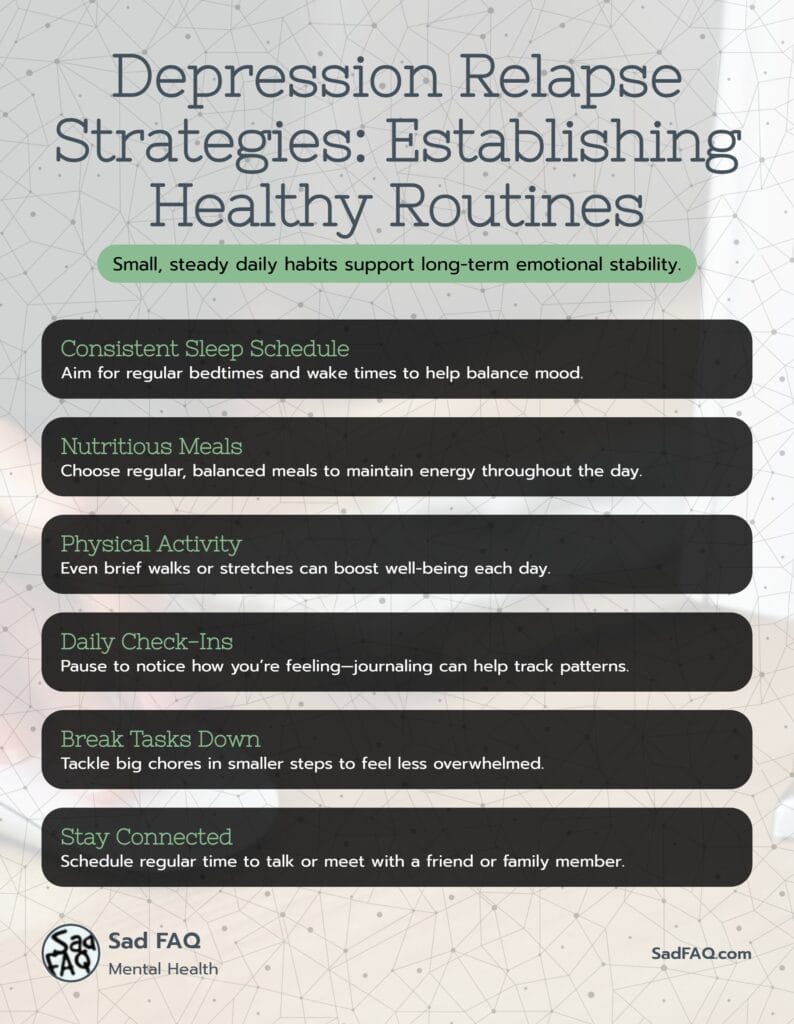
Another great choice is to go for vigorous walks outside. Picture this: you’re walking along a route surrounded with trees, breathing in the fresh air, and watching squirrels do tricks. Yes, those little furballs can put on a great show! Nature has this amazing power to lift our moods. You could laugh at how goofy they look as they chase each other up and down trees or gather acorns like they’re getting ready for a winter carnival.
It’s important to find what motivates you because let’s face it: if you hate your fitness program, you’ll probably stop doing it before you can say “exercise.” So, whether you’re doing yoga in your living room with a cat on your mat (really, why do they always pick the worst spots?), climbing up hills with amazing vistas, or even chasing kids around the park, just start moving!
Research shows that even short spurts of activity can make you feel much better. Don’t worry about spending hours at the gym. Instead, enjoy the tiny times during the day when you can move around and shake things up. Every little bit helps, whether it’s taking the stairs instead of the elevator or performing jumping jacks during commercial breaks (which I highly recommend).
In the end, exercise shouldn’t feel like a punishment; it should be something fun that makes you feel good! So go ahead and look for anything that makes you happy as you work out. After all, life is too short not to have fun moving around and laughing, even if it means looking silly sometimes!
Practicing Mindfulness Techniques

Did you know that practicing mindfulness can actually change your brain? Studies show that regular mindfulness meditation can increase the gray matter in areas of the brain associated with emotional regulation. So, while you’re trying to stay calm and collected, you might just be growing a bigger “feel-good” brain! Who knew sitting still could be so productive?
“Mindfulness isn’t difficult. What’s difficult is to remember to remember.” – Sharon Salzberg
Another great strategy to keep negative thoughts from getting out of hand is to practice mindfulness. Have you ever done meditation? At first, it might sound scary (“Do I really need to sit cross-legged and chant ‘om’?”), but even five minutes of focused breathing can offer tranquility to a chaotic situation.
Mindfulness practices are interesting because they tell us to focus on the present moment instead of worrying about what will happen tomorrow or what happened yesterday. You may attempt guided meditations that you can get online, or you could just do deep breathing exercises anytime stress comes up out of nowhere.
Yoga is another great choice since it blends movement with being aware of your body. Picture this: when you step upon your mat, the outside world disappears. Not only are you extending your muscles, but you’re also giving your mind a break from the stress of daily life. It’s like giving your body and spirit a refreshing hug! Who wouldn’t want that?
Mindfulness Magic: Simple Ways to Stay Present
– The 5-4-3-2-1 Game: This fun technique helps you focus on the here and now. Look around and name 5 things you can see, 4 things you can touch, 3 things you can hear, 2 things you can smell, and 1 thing you can taste. It’s like a scavenger hunt for your senses!
– Breathing Like a Baby: Babies breathe from their bellies, not their chests. Try it! Lie down and place your hand on your tummy. Take deep breaths so that your hand rises and falls like a gentle wave. You’ll feel calmer than a cat in a sunbeam.
– Mindful Eating Challenge: Next time you eat a snack, turn it into an event! Slow down and really notice the flavors, textures, and smells of each bite. It’s like being on a cooking show where the only contestant is…you! Bonus points if you make silly commentary while chewing.
Yoga can be a journey of self-exploration through the different postures. Just imagine doing the downward dog move. When you push your palms into the mat and bring your hips up, you really are making a “human pretzel”. At the same time, this post helps to lengthen your short hamstrings and therefore you can concentrate on your breathing. And talking of breathing, it is the main thing in yoga. Every breath through the nose brings positivity to your system; and at every exhale through the mouth, you let go of the negativity. It is just like blowing off the web of stress that hangs over you!
Yoga is not only about difficult postures or getting the perfect Instagram shot in your stylish leggings (though that is nice too!). It is about feeling what your body wants. Perhaps today is all about slow stretching and the use of restorative postures following a tiring day at work. Or maybe it was a powerful flow where you worked up a sweat as if you had just run a marathon! The goodness is in listening to your inner voice and acknowledging your state.
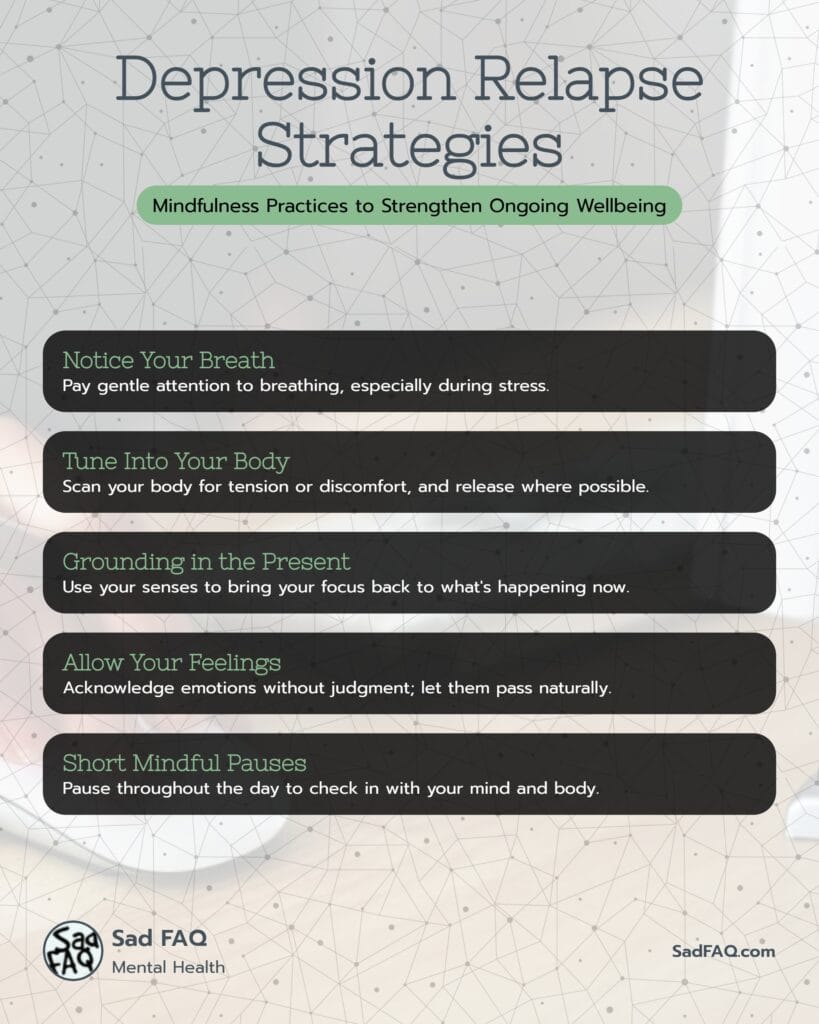
Yoga helps us be mindful, which means being aware of what’s going on around us instead of letting our thoughts whirl around like socks in the laundry (really, where do they go?). When we pay attention to our breath and movements when we practice, we make room for peace and understanding. Stretching for a little while might nearly seem like magic when it comes to clearing up mental clutter!
Also, doing yoga with other people is a great way to connect with others. Sharing these moments with other people, whether in a class full of other fans or online (thank you technology!), makes our experience even better. And let’s be honest: there’s always someone who will make a funny noise when they’re trying to hold a hard stance. Nothing releases the tension better than laughing together!
If you want to balance your body and mind while also taking care of yourself, try yoga! You might feel lighter, both literally and mentally, as if you’ve let go of layers of worry along with those tense muscles. We could all use more hugs in our lives, even if we have to give them to ourselves!
Creating an Action Plan

When creating an action plan for managing depression, consider this: some people find it helpful to treat their mental health like a video game. Level up by setting small, achievable goals—like getting out of bed or taking a shower. Each completed task earns you “points” (or maybe just the satisfaction of not wearing pajamas all day). Just remember, in this game, there are no cheat codes!
“Sometimes you will never know the value of a moment until it becomes a memory.” – Dr. Seuss
Now let’s get down to business and make an action plan just for YOU! This isn’t just any old list; think of it as putting together your own set of tools to help you avoid relapses—your emotional Swiss Army knife!
Start by writing down the coping skills you’ve learned so far on this journey. These could be things like calling friends when you’re feeling low or doing something you love, like painting horrible landscapes. Keep this list close by so that when problems come up—and they will—you’ll know just where to go.
We should also talk about emergency contacts, those people who are always there for us. Picture this: it’s one of those days when everything feels like a huge marshmallow that is dragging you down. You know, the kind where it feels like climbing Mount Everest just to get out of bed? It’s really comforting to know that you have a list of friends or professionals that are just a phone call away and ready to help you out at these times.
Action Plan: Your Roadmap to Resilience
– The Power of Post-it Notes: Writing down your goals on colorful Post-it notes can actually help you remember them better! Stick them everywhere—on your fridge, bathroom mirror, or even the cat. Just don’t blame the cat if it starts ignoring you.
– Dance Like Nobody’s Watching: Research shows that moving your body can boost your mood. So crank up your favorite song and dance like you’re at a wedding where nobody knows how to do the Macarena. Bonus points for awkward moves!
– Mini Goals = Big Wins: Breaking tasks into tiny steps makes them feel less scary. Instead of saying, “I’ll clean my entire room,” try “I’ll find five things to throw away.” Suddenly, you’re a decluttering superhero with a cape made of dust bunnies!
When making your list of emergency contacts, consider about the people who really know you. It may be that friend that always knows how to make you laugh, even if it means cracking bad dad jokes. Or maybe it’s a therapist who has given you the tools you need to deal with life’s ups and downs. Having their names close by is like having a safety net; just knowing they’re there might help calm your mind.
And let’s be honest: we all need someone to listen to us without judging us from time to time. It’s remarkable how talking things over may help us feel better. When we’re stuck in our own thoughts, friends and professionals can help us see things in a new way. You see things more clearly, much like when you first put on glasses. Also, it’s nice to talk about our problems with someone who understands them. It reminds us that we’re not alone on this crazy ride called life.
Making this list of contacts is more than just writing down names and numbers; it’s also taking care of yourself. When we admit that we might need help at times, we give ourselves the strength to ask for it instead of keeping it all to ourselves. It’s like letting yourself depend on other people when things become rough. Let’s be honest, no one wins the “I can handle everything by myself” game!
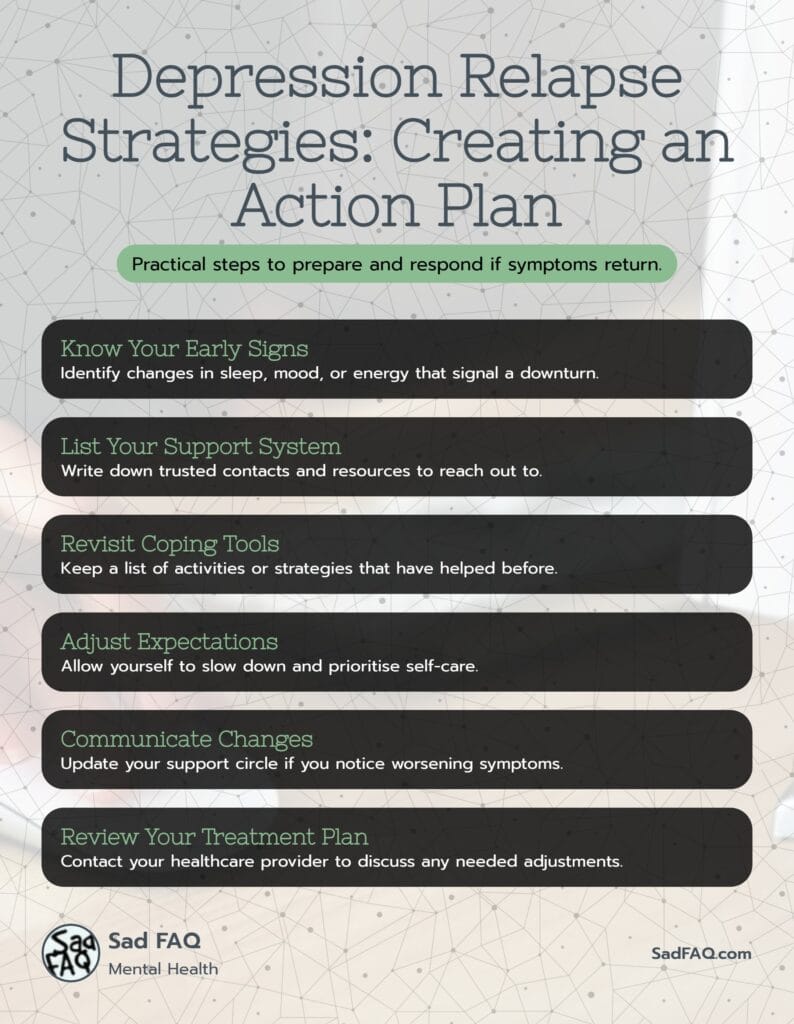
If you really want this list to work for you, the people should be listed along with their communication preferences. Some might be inclined to texting and others could be phone call fans (you know, those old-fashioned ones!). So, when the feeling of being drowned comes upon you and you need to have the support quickly, it is much easier to get in touch with them than to find your keys in the middle of a messy room!
Also, make sure you keep your contact list up to date! Friends move away and new relationships spring up and so on. The thing that really helps you to never lose your friends is updating your list so that you always have their contacts when they matter the most, i.e. when you need them the most. So don’t be shy and write down those names; they might be your only support during a tough time.
It’s not only useful to have an emergency contact network; it’s also important for your mental health. It’s comforting to know that there are individuals who will listen when things are uncertain. It reminds us that we have friends who will be there for us no matter how bad things become! So get your pen out (or open your notes app) and start putting together your superhero team today. You’ll be glad you did!
Finally, and this is very crucial, make sure your goals for the future are reasonable. It takes time to make progress. Celebrating modest wins keeps you motivated without putting too much pressure on you.
Conclusion: Hold on to Hope
In conclusion, and I mean it, I think hope is a huge part of getting better after a depression relapse! Life may throw us curveballs from time to time, but if we learn how to deal with them by identifying our triggers, forming supporting networks, and adopting healthy routines along with mindfulness practices, we will be strong warriors ready to face whatever comes next!
So, here’s my advice: don’t be afraid to ask for help when you need it. Take advantage of every chance you get, for better days are just over the horizon, waiting for you.
Suggested Resources
Understanding Depression
https://www.nimh.nih.gov/health/publications/depression/index.shtml
Coping With Depression
https://www.psychologytoday.com/us/basics/depression/coping-depression
Mindfulness-Based Stress Reduction
https://www.umassmed.edu/cfm/mindfulness-based-programs/mbsr-courses/
Frequently Asked Questions
What is a depression relapse?
A depression relapse occurs when symptoms return after a period of improvement. It may be triggered by stress, routine changes, or emotional overload.
How can identifying triggers help prevent relapse?
Recognizing triggers—such as stressful situations, certain environments, or emotional cues—allows you to prepare coping strategies before symptoms escalate.
Why is journaling useful for managing depression?
Journaling helps you process emotions, track patterns, and reflect on progress. It provides clarity and acts as a healthy outlet during difficult moments.
How does a support network reduce relapse risk?
Friends, family, pets, and support groups offer emotional grounding, encouragement, and connection, all of which strengthen resilience during challenging times.
What routines help maintain mental stability?
Consistent sleep, balanced meals, regular physical activity, and intentional relaxation help regulate mood and support long-term emotional health.
How does mindfulness reduce relapse symptoms?
Mindfulness practices like meditation, breathing exercises, and yoga help calm the mind, improve awareness, and reduce emotional reactivity.
Why is creating an action plan important for relapse prevention?
An action plan outlines coping tools, emergency contacts, and daily strategies, giving you structured support when symptoms resurface.

Kevin Collier is a passionate mental health advocate and writer for SadFAQ.com, where he explores the complexities of depression and mental well-being. With a deep understanding of mental health challenges, Kevin provides compassionate insights and practical advice to help individuals navigate their journeys toward healing. His articles aim to destigmatize mental health issues, offering support and resources for those seeking to improve their emotional resilience. Committed to raising awareness and fostering open conversations, Kevin’s work empowers readers to prioritize their mental health and seek the support they deserve.




